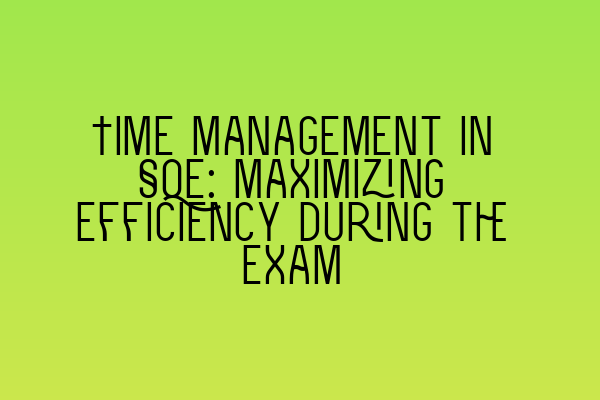Time Management in SQE: Maximizing Efficiency during the Exam
Welcome to our blog post on time management in the SQE exam! In this article, we will share valuable tips and insights on how to maximize your efficiency during the exam and make the most of your allotted time. Time management is a crucial aspect of exam preparation, and by implementing effective strategies, you can enhance your performance and achieve success in the SQE. So let’s dive in!
The Importance of Time Management
Time management plays a significant role in any exam, including the SQE. The exam is designed to assess not only your knowledge but also your ability to apply that knowledge under time constraints, much like the real-world scenarios you will face as a solicitor. With limited time available, it is essential to manage your time effectively to complete all sections of the exam and answer every question thoroughly.
Related Article: Joint Ownership: Legal Considerations for Co-Owners of Property
Create a Study Schedule
Before the exam, create a detailed study schedule that includes dedicated time for each section and topic. Allocate more time to areas you find challenging while ensuring you cover all required subjects adequately. Stick to your schedule to build discipline and establish a routine.
By having a study schedule, you can effectively manage your time leading up to the exam and identify any knowledge gaps that need to be addressed. Following a well-structured plan will also help alleviate last-minute cramming, reducing stress and anxiety on the day of the exam.
Practice Time-Constrained Questions
A crucial aspect of time management is practicing time-constrained questions. Mock exams and practice papers are invaluable tools to refine your time management skills. Set a timer and simulate exam conditions while answering questions. This exercise will help you gauge how much time you should allocate to each question and section.
Furthermore, practicing time-constrained questions will enhance your ability to think quickly and critically, ensuring you can provide accurate and concise answers within the allocated time frame.
Related Article: Commercial Leases: Essential Insights for Business Premises
Read and Understand the Instructions
One common mistake students make is rushing through the instructions. Take the time to read and understand the instructions before diving into the questions. Familiarize yourself with the structure, requirements, and allocation of marks for each section.
By understanding the instructions, you can plan your time accordingly and focus on the areas that carry more weight in terms of marks. Skipping this step can lead to confusion and wasted time, affecting your overall performance in the exam.
Manage Your Time during the Exam
When you begin the exam, quickly skim through all the questions to get an idea of the topics covered and their level of difficulty. Identify the questions you feel confident about and start with those first. This strategy helps you gain momentum and reduces the risk of getting stuck on one difficult question and running out of time for the rest.
Allocate a specific amount of time to each question or section based on its mark value. Stick to this time allocation to ensure you have sufficient time to complete all sections. If you find yourself spending too much time on a particular question, make a note to come back to it later if you have time left.
Related Article: Tenant Rights in the UK: Understanding Your Legal Protections
Stay Focused and Avoid Distractions
During the exam, it’s crucial to stay focused and avoid distractions. Turn off your phone or put it on silent mode to minimize interruptions. Choose a quiet and comfortable environment where you can concentrate without distractions.
Avoid spending too much time on research during the exam. While it is essential to cross-check your answers, spending excessive time on research can eat into your allocated time. Strike a balance between confirming your answers and completing the exam within the given time frame.
Utilize Effective Note-Taking Techniques
Note-taking is a valuable skill in any exam. Develop efficient note-taking techniques that enable you to quickly jot down key points without sacrificing comprehension. This skill becomes particularly useful in long-form questions, where organizing your thoughts and ideas can help you provide a well-structured and concise answer.
Review and Revise
Allocate some time at the end of the exam to review your answers. Look for any errors or omissions and make necessary corrections. Use this time to ensure your answers are clear, coherent, and address all parts of the question.
Remember that time spent on reviewing and revising is as important as the time spent on answering the questions. It is your final opportunity to improve the quality of your responses before submitting the exam.
Related Article: Examining the Intricacies of Land Law in the UK
In Conclusion
Time management is a critical skill that can significantly impact your performance in the SQE exam. By creating a study schedule, practicing time-constrained questions, understanding instructions, managing your time during the exam, staying focused, utilizing note-taking techniques, and reviewing your answers, you can maximize your efficiency and improve your chances of success.
For more information on legal considerations related to property law, joint ownership, commercial leases, tenant rights, residential leases, and other essential insights for solicitors, be sure to check out our related articles.
Related Article: Legal Considerations in Residential Leases: Essential Insights for Solicitors
We hope these tips and strategies will help you excel in the SQE exam. Good luck!

Leave a Reply